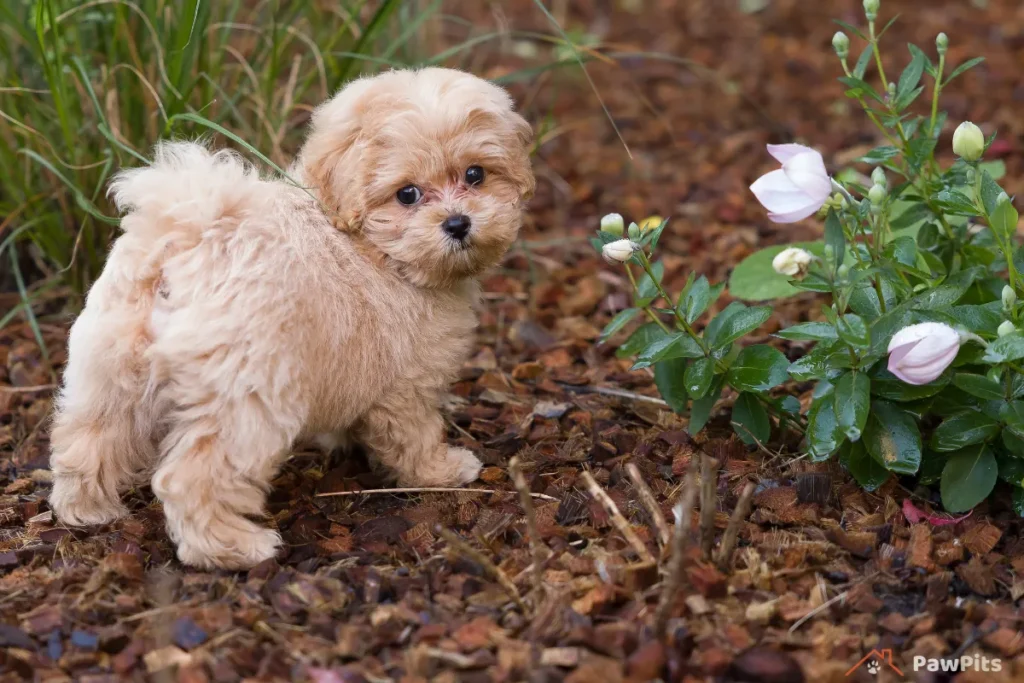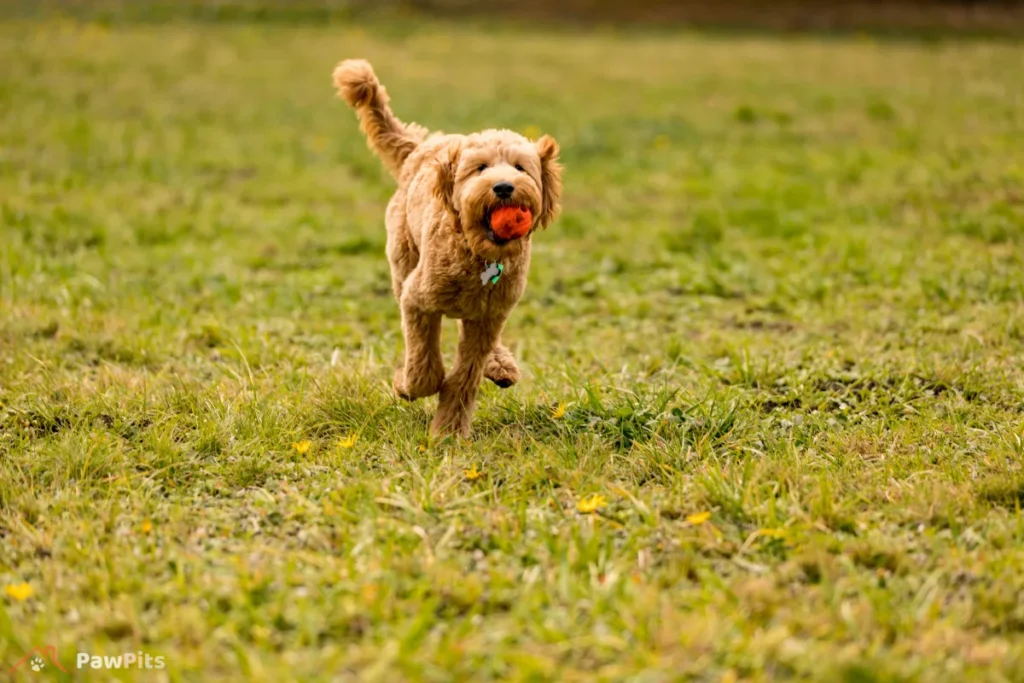Getting a Mini Aussiedoodle puppy is a memorable moment. With their boundless curiosity, energetic spirit, and strong attachment to their families, Mini Aussiedoodles quickly become the heart of any household. Yet, beneath those soulful eyes and fluffy coats lies a unique blend of traits that need careful nurturing. This guide will help you understand Mini Aussiedoodle behavior. It includes important tips to keep your puppy healthy, happy, and well cared for.
How the Australian Shepherd-Poodle Crossbreed Idea Began!
The idea of crossbreeding Australian Shepherds with Poodles and getting a mini aussiedoodle puppy, resulting in breeds like the mini aussiedoodle puppy, originated from a desire to combine desirable traits from each lineage. People who breed dogs wanted to make a new type of dog. Like the Australian Shepherd, they wanted this new dog to be smart, loyal, and hard-working. They wanted a dog that wouldn’t make people allergic and would be easy to train, similar to a Poodle. This crossbreed trend, which began in the 1980s and 1990s, aimed to meet the needs of a wider range of dog owners who wanted pets suited to family life but with fewer grooming and allergy concerns.
Here’s a breakdown of what each breed brought to the table and why breeders saw value in this pairing and getting healthy mini aussiedoodle puppy:
- Australian Shepherd Traits Intelligence and Work Ethic
Australian Shepherds are known for their intelligence and strong herding instincts, making them quick learners and highly responsive to commands. They excel in tasks requiring mental engagement and focus, which is why they are often used as working or agility dogs.
Energy and Athleticism: These dogs have high energy levels, making them ideal for active individuals or families who want an engaging, outdoor-loving pet.
Family Loyalty and Friendliness: Australian Shepherds are affectionate and bond closely with their families, traits highly valued by dog owners. - Poodle Traits Hypoallergenic, Low-Shedding Coat
Poodles have a curly coat that sheds minimally, making them popular among people with allergies. This trait is one of the primary reasons for crossbreeding Poodles with other breeds, as it can produce offspring with reduced allergen potential.
Poodles are very smart dogs and learn quickly. They want to make their owners happy, which makes them easy to train. These qualities work well together with Australian Shepherds.
Versatile Size Options: Poodles come in standard, miniature, and toy sizes, allowing breeders to create crossbreeds of various sizes to fit different living environments. The Miniature Poodle is most commonly used for Mini Aussiedoodles, making a medium-sized dog ideal for many households. - Creating the Ideal Companion Dog:
The intention behind breeding the Mini Aussiedoodle was to create a dog that combined the best of both worlds:
A dog that is clever, lively, and able to form strong connections with its family. A companion with a coat that is easier on allergy sufferers and lower maintenance when it comes to shedding. A crossbreed has the potential to be more adaptable to different living environments, such as smaller homes or apartments, due to the Miniature Poodle’s more compact size.
- Temperament and Behavioral Benefits
By mixing these two intelligent breeds, breeders aimed to produce dogs that were not only physically agile but also mentally sharp, with an easygoing and friendly temperament suited to both families and individuals.
Crossbreeding also provides an opportunity to blend behavioral traits, aiming for an active dog but also calm enough for households with children. - Health Benefits of Crossbreeding
Crossbreeding is done because people hope for “hybrid vigor.” This means that mixed-breed dogs may have fewer health problems than their parent breeds compared to purebred dogs. This isn’t a guarantee, but it’s a known reason why breeders often consider crossbreeds, as they may have a wider genetic pool, potentially reducing the risk of hereditary diseases.
- Rising Popularity of Designer DogsMini Aussiedoodles are part of a larger trend of “designer dogs” or intentional crossbreeds, such as Labradoodles (Labrador Retriever and Poodle) and Goldendoodles (Golden Retriever and Poodle). This trend began with a demand for dogs that fit the lifestyles of modern families intelligent, affectionate, lower-shedding, and hypoallergenic. This movement in breeding practices made the Mini Aussiedoodle one of the more recent, but increasingly popular, crossbreeds as people sought pets that fit various lifestyles and health requirements.

Understanding the Mini Aussiedoodle Temperament
Overview of Mini Aussiedoodle Temperament
Mini Aussiedoodles are special dogs that come from Australian Shepherds and Poodles. They are very loving and loyal pets. They enjoy being with their families and being part of everyday activities. Their temperament is lively and adaptable, but knowing what to expect will help you meet their unique needs.
Personality Traits of Mini Aussiedoodles
- Friendly and Affectionate: Mini Aussiedoodles are known for their close bonds with family members. They thrive on attention and affection, making them ideal for households where they can be actively engaged.
- High Energy and Playfulness: These mini aussiedoodle puppy ‘s bring lots of energy to the table, needing plenty of physical and mental engagement to stay happy and calm.
- Intelligent and Trainable: With roots in two highly intelligent breeds, Mini Aussiedoodles are quick learners. They excel in activities that challenge their mind, like puzzle toys and obedience training.

Mini Aussiedoodles with Children and Other Pets
Mini Aussiedoodles generally get along well with children and other pets. They’re playful but gentle, making them a good match for families. Early socialization is essential to ensure they interact harmoniously with both people and pets. Consider enrolling your puppy in socialization classes or arranging playdates to help them feel confident around different types of animals and people.
Essential Care Tips for Mini Aussiedoodles
Daily Care and Routine Needs
Creating a daily routine that addresses your Mini Aussiedoodle’s exercise, mental stimulation, and social needs is crucial to their overall well-being.
Exercise Requirements
- Activity Level: Try to do 1-2 hours of exercise every day. This will help use their energy and keep them healthy.
- Ideal Activities: Activities like playing fetch, agility exercises, and obedience games are fun and mentally stimulating.
Mental Stimulation for Intelligent Breeds
- Puzzle toys and games: These are fun and can keep kids busy for a long time. They help to satisfy their natural curiosity.
- Training Sessions: Regular obedience training or teaching new tricks will keep their mind engaged and prevent boredom, which often leads to unwanted behaviors.
Sample Daily Routine:
- Morning: Brisk walk or jog for 30 minutes
- Afternoon: Interactive play or obedience training session for 20 minutes
- Evening: Mental stimulation with puzzle toys
Feeding and Nutrition Guidelines
What to Feed a Mini Aussiedoodle Puppy
Diet is essential to Mini Aussiedoodle care, ensuring your puppy has the nutrients needed for growth and energy.
Nutritional Requirements for Mini Aussiedoodles
- Balanced Diet: They need a balance of proteins, healthy fats, and carbohydrates to keep them active and strong.
- High-Quality Dog Food: Look for high-quality dog food specifically formulated for small, active breeds, or discuss homemade diets with your vet to ensure all nutritional needs are met.
Feeding Schedule and Portion Sizes
- Puppies: Offer meals 3-4 times per day to support their growth.
- Adults: Feed twice a day, adjusting portions based on activity level, weight, and age.
Sample Feeding Plan
| Time of Day | Food Type | Portion Size |
|---|---|---|
| Morning | Dry kibble or wet food | 1/4 to 1/2 cup |
| Afternoon | A small meal or a healthy treat | As directed by vet |
| Evening | Dry kibble or wet food | 1/4 to 1/2 cup |
This feeding table is just an example always adjust based on your puppy’s specific needs and consult a veterinarian for tailored advice.
Grooming Requirements for Mini Aussiedoodles
Keeping Your Mini Aussiedoodle’s Coat Healthy
Mini Aussiedoodles often have wavy or curly coats, which can require regular grooming to stay clean and tangle-free.
Coat Types and Grooming Needs
- How often to groom: Brush their fur 2-3 times each week to keep it from tangling. Also, take them to a groomer to get their fur trimmed every few months.
- Hypoallergenic Qualities: Many Mini Aussiedoodles have hypoallergenic coats, thanks to their Poodle parentage, but brushing still helps minimize shedding and dander.
Bathing and Hygiene Tips
- Bathing Frequency: Try to bath your puppy every 4 to 6 weeks. This helps keep their fur and skin in good shape.
- Grooming Tools: To groom your dog at home, you will need a few important things. First, get a slicker brush to brush your dog’s fur. You will also need dog shampoo that is safe for your pet. Lastly, make sure to have nail clippers to trim your dog’s nails. These tools are very important for grooming.
Training and Socialization
Training Your Mini Aussiedoodle for Success
Training is essential for Mini Aussiedoodles, who are intelligent but can become easily bored if not stimulated.
Basic Obedience Training Tips
- Positive Reinforcement: Mini Aussiedoodles respond best to positive training methods, such as treats, toys, and praise.
- Simple Commands: Start with basic commands like sit, stay, and recall, then progress to more complex tricks to keep them engaged.
Socialization Strategies for Mini Aussiedoodle Puppy
- Early Exposure: Expose your puppy to a variety of environments, people, and other animals to help them feel secure and well-adjusted.
- Puppy Socialization Classes: These classes are valuable for controlled socialization, helping puppies learn good manners with both people and other dogs.
Key Commands: Begin with important commands such as sit, come, and leave. Gradually introduce other commands as your puppy becomes more comfortable with training.

Health and Wellness
Keeping Your Mini Aussiedoodle Healthy
Like all dogs, mini aussiedoodle puppies need preventive care to stay healthy and avoid common health issues.
Common Health Issues in Mini Aussiedoodles
- Genetic Health Risks: Mini Aussiedoodles might have some health problems like hip dysplasia, allergies, and eye issues. It’s very important to take them to the vet for regular check-ups to keep them healthy.
- Preventive Care: Schedule vet visits every 6-12 months to catch any health issues early.
Vaccinations, Preventatives, and Vet Visits
- Mini aussiedoodle puppy Vaccinations: Essential shots include rabies, distemper, and parvovirus to protect your puppy from common diseases.
- Use monthly medicine to protect your pets from fleas, ticks, and heartworms. This helps keep them safe from these pests.
| Age | Vaccination | Frequency |
|---|---|---|
| 8-10 weeks | Distemper, Parvovirus | Initial dose |
| 12-14 weeks | DHPP booster, Leptospirosis | Booster |
| 16-18 weeks | Rabies | Final dose |
| Annually | All necessary boosters | Annually |
Mini Aussiedoodle Care FAQ
In conclusion, here are answers to some common questions about taking care of Mini Aussiedoodles:
What’s the best age to start training a Mini Aussiedoodle puppy?
- mini aussiedoodle puppy Start as early as 8-12 weeks. At this age, puppies are highly receptive to learning basic commands and routines.
Are Mini Aussiedoodles good for apartments?
- Yes, they can live comfortably in apartments if they get enough exercise every day. These active pups need physical and mental outlets to prevent boredom.
How much should a mini aussiedoodle puppy sleep?
- Mini aussiedoodle puppies typically sleep around 16-20 hours per day, while adults usually need 12-14 hours to recharge.
How often do Mini Aussiedoodles need grooming?
- Brushing your pet’s fur every week and taking them to a groomer every few months will help keep their coat healthy and stop too much fur from falling out.
Is a Mini Aussiedoodle hypoallergenic?
- Dogs with Poodle ancestry usually have coats that don’t cause allergies. Regular grooming can help reduce allergens even more.
Conclusion:
Raising a Mini Aussiedoodle is a deeply rewarding journey that requires understanding, patience, and commitment. These puppies have a loving nature and need special care, like grooming and training. They do best in families that spend time with them and help meet their needs.
With the right approach, your Mini Aussiedoodle can grow into a loyal, joyful, and well-behaved companion who brings endless love into your life.


2 thoughts on “mini aussiedoodle puppy temperament and care about”